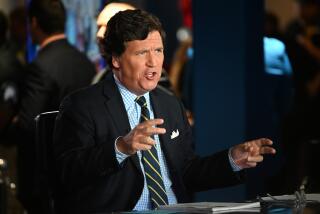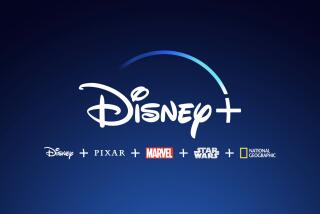European TV Entering Digital Domain
- Share via
When Canal Plus, France’s leading pay-TV company, announced recently it would merge with the Dutch firm Nethold, the $1.64-billion move was a bit reminiscent of an arranged marriage of two 16th century royals. Canal Plus (rhymes with “loose”) pledged its 6.6 million subscribers in France and other countries and a valuable digital TV decoder. Nethold brought to the union nearly 2 million subscribers and its own decoder, transformed overnight from a threat to an asset. Together the two hope to pool resources, corner the market for sports and cinema, dominate the development of digital TV and invade an expanse of territory that stretches from Paris to Rome, Madrid, Oslo, Berlin--and beyond.
But first they will have to push aside at least one potent upstart: a newly formed consortium called TPS (Television par Satellite), which announced its intention to move into untapped European territory armed with its own decoder and $600 million worth of program deals sewed up, seemingly overnight, at Paramount Pictures.
The stakes are dramatic. In contrast to countries such as Germany, where cable TV is well-established, France, Italy and, to a lesser extent, Spain are ripe for satellite-delivered digital TV. The winner simply needs to line up the world’s best sports and cinema and a consumer-friendly decoder, and millions of entertainment-starved households will rush to subscribe.
Small surprise, then, that Canal Plus Chief Operating Officer Marc-Andre Feffer is angry about the nature of the competition.
TPS was welded together by public broadcaster France Television, public telephone monopoly France Telecom, privately held TV channels M6 and TF1, and private companies CLT of Luxembourg and Lyonnaise des Eaux.
“It’s a confusion between the role of the state and a classic shareholder-owned company,” Feffer said in a recent interview at Canal Plus’ stark white headquarters overlooking the Seine in Paris. “And we will fight it.”
Feffer also believes TPS’ makeup gives its member companies unfair leverage when they bid for programming.
The two rivals are already fighting over access to lucrative sports programs. TF1 sued this week to block the Canal Plus-Nethold merger--or at a minimum the elements that would allow Canal Plus to absorb Nethold’s sports channels--and last month it contested a Canal Plus deal giving it exclusive rights to air French soccer games.
TPS’ high-priced bid for Hollywood property virtually guarantees a bruising battle for top-name films. This week, Canal Plus announced programming deals with Columbia TriStar and with MCA, and already has rights to Disney product.
Come December, the announced time of the TPS digital TV launch, the two companies will be chasing after the same consumer dollars that Canal Plus is counting on to balance its post-honeymoon books. This could provoke a draining bidding war.
Here’s another problem. Unless the rivals sign a peace pact agreeing to a standardized decoder box, consumers will dawdle as they contemplate the VHS-versus-BETA-like options, which could also exert downward pressure on subscription fees.
Feffer said there are four decoders on the European market and he hopes for development of a single box but refuses to contemplate standardized decoding software, saying it would raise the risk of piracy. TPS has so far declined to agree to a shared box, let alone software.
Canal Plus has weathered other crises since its creation in 1984, when Andrew Rousselet patched it together with a go-ahead from then-President Francois Mitterrand. A year later, Mitterrand nearly knocked the legs out from under the fragile enterprise when he approved new free-TV channels, including M6, thus dampening consumers’ zeal for pay TV.
The company survived, generating $2 billion in revenue last year and posting a first-half net profit this year of $75 million, up 16.6% over the equivalent 1995 period. Overall profit for 1996 is expected to be about the same as it was in ‘95, Feffer said. Among other things, the company is absorbing the cost of its digital-satellite services start-up in April.
Canal Plus has exclusive rights to broadcast all French soccer games in the next three years, which it will distribute as pay-per-view. Its budget for programming this year is roughly half a billion dollars, which under French law must go largely (60%) to programs of European origin--two-thirds of them French. Ultimately, this means buying up every French movie it can lay its hands on, Feffer acknowledged, while zeroing in on a relatively small portion of American blockbusters.
Canal Plus is headed by Pierre Lescure, a 51-year-old former journalist known for his love of American rock ‘n’ roll, Florida vacations and creative thinking. The average age of his 1,500-person work force is 32.
Lescure and Feffer, a lawyer and former civil servant, aren’t new to Hollywood. Convinced early on that Canal Plus needed to produce its own U.S.-style films, the company, together with Regency and Carolco, co-produced a few major hits such as “Terminator” and “Free Willy.” But after Carolco went bust and Canal Plus signed onto a few notable flops (e.g., “Free Willy 2”), it soured on California and retreated to French soil.
For the last 18 months, the company’s film production arm, Studio Canal Plus, has been cultivating local talent out of elegant, old-fashioned offices on a quiet street near the Champs-Elysee. It has plans to co-produce English-language films with Sony Pictures in London and to nurture filmmakers in other European countries.
Helping to feed the maw are Canal Plus’ TV production arm, Ellipse, which makes game shows and sitcoms, and several recently acquired film libraries, including Carolco’s. Canal Plus’ long-range plan, Feffer said, is to develop market clout by controlling rights on enduring films.
But the digital TV revolution is the top priority. With the promise of clear resolution and the possibility of delivering hundreds of channels (not to mention Internet-telephone connections, computer games and the like), via satellite, dish and decoder, digital TV is expected to usher in a new era of entertainment by choice--”zapping a go-go,” in local parlance.
Canal Plus hopes to have nearly 2 million digital TV subscribers by 2005. In theory, each of those subscribers will either buy a box or put a deposit on a rented one, generating huge amounts of cash on the side.
According to some estimates, the French watch half as much TV as Americans. A mere 2 million households have cable, or 10% of the potential market. This either means the French have better things to do with their leisure time, or they’re just waiting for a better offer.
Feffer blames the French government for stimulating free TV at the very time cable TV was trying to get established. Now that satellite pay TV is the vogue, he’s determined to see Canal Plus reap the benefits of 12 years in the subscription-marketing business.
Whereas France and Germany are prime markets, he views Italy (where Nethold already has a stake) as the most desirable of all, because so few Italian households have cable. Italians reportedly also watch more TV than any other Europeans.
Everyone in the business is convinced that digital is the future. But it’s expensive, so it’s unlikely any given country can sustain more than one provider. Which is why rival factions keep patching together working relationships.
(BEGIN TEXT OF INFOBOX / INFOGRAPHIC)
The Rivals at a Glance
CANAL PLUS
Based in France, with operations in Belgium, Spain, Germany, Poland and parts of Africa, Canal Plus describes itself as Europe’s leading pay-television company and operator of Europe’s first commercial digital TV service.
* Founded: November 1984
* Digital satellite launch: April 1996
* Ownership: Two main shareholders, Havas and Compagnie General des Eaux. (At the end of 1995, Havas owned 23.6% and CGE owned 20.4%; other owners included CDC with 6.3% and Societe Generale with 5%. There were an estimated 50,000 shareholders all told; public investment constitutes 38.2% of ownership.)
* 1995 revenue: $2 billion
* Chairman: Pierre Lescure
TPS
Television par Satellite describes itself as having been forged by the biggest communication companies in France with the goal of offering satellite-distributed digital programs and services.
* Founded: June 1996
* Expected launch of digital TV by satellite: December 1996
* Ownership: Private television channel TF1, 25%; France Television Entreprises (includes France Television, which runs public TV stations France 2 and France 3, and the publicly owned utility France Telecom), 25%; Private TV channel M6, 20%; CLT (Compagnie Luxembourgeoise de Telediffusion), 20%; Lyonnaise des Eaux, 10%
* President: Patrick le Lay
More to Read
The biggest entertainment stories
Get our big stories about Hollywood, film, television, music, arts, culture and more right in your inbox as soon as they publish.
You may occasionally receive promotional content from the Los Angeles Times.










